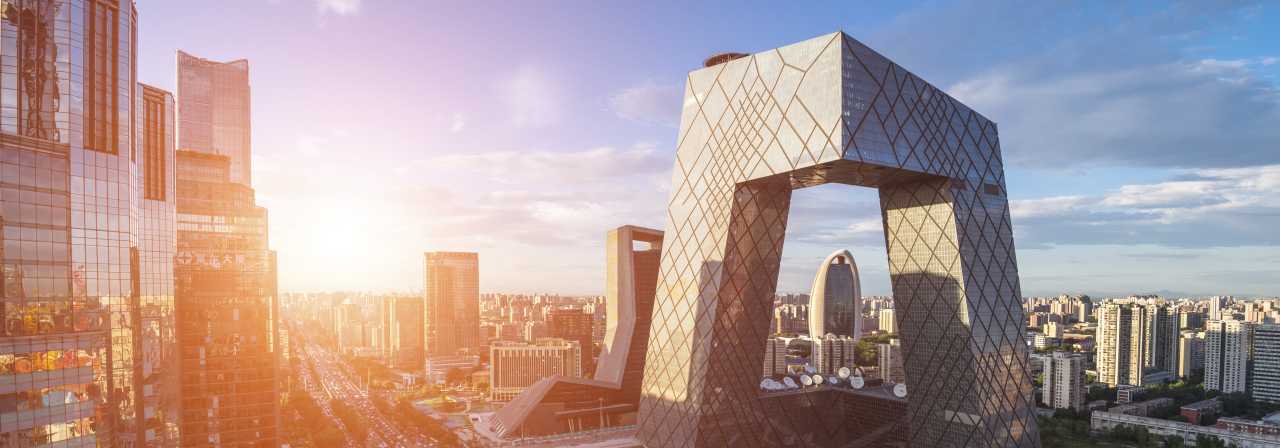Life in Beijing: What expats really think
Ni hao! Welcome to Beijing, the city where tradition meets innovation, and where expats from all over the globe are finding their place. In this guide, we’ll dive into what living in Beijing is really like the highs and the lows. From tips on adapting to life in this dynamic city to making new friends, we’ve got you covered. We’ll also answer some of your top questions on the topics that expats are most curious about when they’re new here.
Advertisement
Ole Jacobsen
Beijing has so much to offer for expats. InterNations helped me explore the international community and many close friends.
Farrah Thompson
At one of the InterNations events here in Beijing I eventually met my French boyfriend, who is an expat just like me.
Why you'll love InterNations in Beijing
and countless possibilities for fun and friendship!
Advertisement
Advertisement
The pros & cons of living in Beijing
Before moving, it’s important to weigh the pros and cons. We’ve gathered key insights on life in Beijing from our expat community and the 2024 Expat Insider survey, which includes input from over 12,000 expats worldwide.
Here are the main ups and downs of living in Beijing.
Pros of Living in Beijing:
Rich culture: Beijing’s culture is a huge draw, and there’s always something to check out. Hiking the Great Wall is a must, and the best part is that it’s right in your backyard, just about an hour away from the city. Many expats (70%) are happy with the culture and nightlife in China (vs. 66% globally).
Career prospects: The capital is a great place to grow in your career. The city has a competitive job market, especially in industries like retail, tech, finance, and tourism. In our survey, 62% of expats in China say they’re happy with the career opportunities (vs. 53% globally).
Affordable life: The cost of living is lower than in many Western cities, and groceries and daily expenses like haircuts are cheaper. Local foods like rice, noodles, and vegetables are easy on the wallet, although imported items like cheese or coffee can get pricey (because of low local demand). When it comes to personal finance, most expats in China (82%) feel like their disposable income is “about or more than enough” for a comfortable life (vs. 70% globally).
Feeling of safety: Beijing feels secure, and people generally feel safe walking alone, even at night. The presence of police and security is noticeable, and crime here is lower than in many other major cities.
No car? No problem: Public transportation in Beijing is excellent. There are over 29 subway lines, 1,200+ bus routes, and thousands of taxis, so you’ll always have options to get where you need to go. It’s also very walkable in the central parts of the city. It’s no surprise that 92% of expats in China say they’re happy with the availability of public transportation, while 96% are happy with its affordability .
Cons of Living in Beijing:
Digital life: A big downside is the slow internet speeds, especially when trying to access foreign websites. If you’re used to browsing the internet freely, you might get frustrated here, as unrestricted access to social media and online services can be limited. Strikingly, a large share of expats (73%) are unhappy with the access to online services (vs. 6% globally).
Pricey rents: Rent in Beijing can be expensive compared to other parts of China. While accommodation in the suburbs is cheaper, living in the city center will likely stretch your budget. Also, landlords usually ask for a hefty deposit and a few months’ rent in advance, so it’s important to plan ahead.
Language barrier: Around 76% of expats in China say they struggle with learning the local language, which can make things a little tricky in daily life. Some expats live in Beijing for years without learning Mandarin, but it does come with challenges — for example, it might limit housing options. Living outside expat areas usually means you’ll need at least basic Mandarin to get by. Having local friends can make things a lot easier when navigating non-expat neighbourhoods.
Environmental issues: Air quality is a big concern here, so it’s a good idea to invest in an air filter and high-quality masks. Tap water isn’t safe for drinking, so most people rely on large water dispensers. Pollution and food contamination are also common concerns.
Difficult cultural adjustment: Adjusting to Beijing’s culture can be tough for some, as the city has its own rhythm. Smoking is common everywhere, and there’s usually a lack of personal space, especially in public transport and crowded areas. The work culture is more hierarchical, so communication with bosses might not be as open as you might expect. This ties into the limited freedom of speech here —many people feel they can’t express themselves as openly as they’d like. In our survey, 50% of expats say it’s easy to get used to the local culture (vs. 59% globally).


Advertisement
Join Our Exciting Events in Beijing
Beijing is full of contrasts — ancient temples next to futuristic skyscrapers, quiet tea houses tucked between busy street markets. With so much to explore, it helps to have a starting point. That’s where InterNations Events come in!
Discover experiences that go beyond the usual tourist spots — think food tours, rooftop networking nights, hidden speakeasy meetups, and weekend hikes led by our InterNations Ambassadors. Whether you’re new to the city or have been here for a while, our events make it easy to connect with people and experience the best of Beijing. We can’t wait to welcome you!




Advertisement
Advertisement
All your questions about Beijing answered
Your most pressing questions about moving to Beijing are answered in this section. From pre-move knowledge about visas to day-to-day essentials like cost of living, healthcare, safety, accommodation, and transportation, we cover it all. And we even have tips on how to make friends!
Living in Beijing can vary in cost depending on your lifestyle and preferences. The following table provides a rough overview of the standard living expenses you can expect, but many items will differ based on your individual circumstances. For example, the cost of public health insurance is often tied to your salary, and groceries can be less expensive or more depending on your choices.
| USD | Local currency | |
1-bedroom apartment* | 520 USD | 3,650 CNY |
3-bedroom apartment* | 1,150 USD | 8,000 CNY |
Utilities | 60 USD | 415 CNY |
Internet & phone | 23 USD | 160 CNY |
Health insurance | 115-215 USD | 800-1,500 CNY |
Public transport | 33 USD | 230 CNY |
Groceries | 290-430 USD | 2,000-3,000 CNY |
Inexpensive meal | 5 USD | 30 CNY |
The average monthly net salary (after tax) in Beijing is approximately 1,440 USD. However, expatriates generally earn more than the average local salary, particularly in sectors like finance, tech, and education. Salaries for expats in Beijing tend to vary based on industry, experience, and additional benefits such as housing allowances or health insurance.
To find a place to live in Beijing, you can start by browsing local real estate websites or using apps like Beike or Ziroom. You can also work with an agent, especially if you’re looking for something specific or don’t speak Chinese fluently. Renting directly from landlords is possible, but agents can help navigate contracts and negotiations, especially for expats.
When it comes to cost, it varies depending on where you want to live. Here’s a rough idea of what you might expect:
In central areas like Chaoyang and Dongcheng:
• 1-bedroom apartment:1,100–2,100 USD
• 3-bedroom apartment: 2,100–4,200 USD
In less central areas it can vary a lot more:
• 1-bedroom apartment: 350–700 USD
• 3-bedroom apartment: 830–1,650 USD
Keep in mind, these prices can change depending on the apartment’s size, location, and condition.
When it comes to choosing a place to live in Beijing, it really depends on what you’re looking for. Some expats want to be close to work or schools, while others care more about easy transport links or having access to Western supermarkets and restaurants. Here are a few neighborhoods where many expats end up:
• Chaoyang: This is one of the most popular spots for expats. It’s central, so you’re close to many embassies, offices, and international businesses. It’s also packed with restaurants, bars, and Western amenities, so it’s perfect if you like being in the middle of things.
• Shunyi: If you have a family or prefer a quieter, more suburban lifestyle, Shunyi is a great choice. It’s known for international schools and a more peaceful atmosphere. Though it’s a bit further from the city center, it’s close to the airport, making it convenient for frequent travelers.
• Haidian: Haidian is ideal for those working in tech or academia, with lots of universities and research centers. It’s a bit more relaxed than Chaoyang but still has good public transport and a growing expat community.
• Fengtai: If you’re looking for something more affordable, Fengtai might be worth considering. It’s a little outside the main city, so you’ll need to commute a bit, but the cost of living is lower and you’ll find a quieter environment.
In Beijing, expats usually rely on private hospitals and clinics, as they offer higher-quality care and English-speaking staff. The public healthcare system is available, but the language barrier can be a challenge. You can get health insurance through your employer or purchase an international plan that covers you while living in China.
Examples of private hospitals that expats frequently use:
• Beijing United Family Hospital
• Puhua International Hospital
Some options for international health insurance:
Technically, no. But it will definitely make your life easier. Many expats manage in Beijing without speaking much Chinese, especially in areas with lots of international companies or near tourist spots. That said, knowing some basics can help with everyday tasks like shopping, ordering food, or getting around. If you’re planning to stay long-term, picking up the language could be a huge advantage.
Here are a few useful tips:
• Basic phrases: Knowing some key phrases can make life in Beijing a lot easier. For example, “Ni hao” (hello) and “Xie xie” (thank you) will help with basic greetings. If you’re shopping, “Duo shao qian?” means “How much?” and “Wo ting bu dong” means “I don’t understand.” If you’re out and about and need help, “Toilet zai na li?” means “Where is the toilet?” and “Wo yao” means “I want…” for ordering food.
• Translation apps: Apps like Google Translate or Pleco can be lifesavers when you need to communicate or read menus.
• Language exchange: If you want to practice Mandarin, join a language exchange group or use language learning apps like HelloTalk or Tandem to improve your skills.
Getting a work visa in Beijing involves several steps, but your employer will usually guide you through the process. Here’s a simplified overview:
1. Find a job: You’ll need a job offer from a company that can sponsor your visa.
2. Documents: You’ll need to provide documents like your passport, academic qualifications, health check reports, and sometimes a criminal background check.
3. Z visa: This is the initial visa you’ll get once you’re approved for a job. It’s valid for up to 3 months.
4. Residence permit: After arriving in China, you’ll apply for a residence permit that will allow you to stay long-term.
5. Work permit: This is a separate document that your employer helps you get once the visa process is complete.
Beijing has an extensive and reliable public transportation system and getting around is relatively easy. Here are some of your transportation options:
• Metro: Covering most areas of the city and even extending to some suburban districts. You’ll find signs in English, making it easy to navigate. Costs typically between 3 to 6 CNY (around 1 USD) per ride, depending on the distance.
• Buses: Generally cheaper than the metro, but they can be crowded. The cost is typically between 2 and 5 CNY (around 1 USD or less) per ride.
• Taxis: Taxis are widely available but can be slower during peak hours due to traffic. The fare starts at 13 CNY (around 2 USD), and additional charges apply based on the distance.
• Ride-hailing apps: Services like Didi are popular for expats. Fares depend on time of day, traffic, and distance, but it’s generally more affordable than taking a taxi in many cases.
• Bikes and e-scooters: Beijing offers several bike-sharing options like Ofo, Mobike, and Hello Bike, as well as e-scooters for short-distance travel.
• Politeness: In China, it’s common to show respect through formalities. Always greet people with a handshake or slight bow. It’s a good idea to use formal titles when addressing people (e.g., Lǎoshī for teacher, Zhǔrèn for manager).
• Gift-giving: Offering gifts is a common practice in China, especially in social or business settings. If you give a gift, make sure it’s wrapped nicely, but don’t expect it to be opened right away.
• Face (mianzi): The concept of “face” is important in Chinese culture, meaning it’s crucial to avoid embarrassing others publicly. Always be mindful of how others perceive your actions, particularly in group settings.
• Personal space: While not as much of a concern in crowded cities like Beijing, try to avoid being too direct or too informal with strangers. People will generally be friendly, but they may appreciate a respectful distance.
• Dining etiquette: If you’re invited to a meal, wait for the host to begin eating before you start. Also, it’s polite to offer food to others around the table before serving yourself.
Since Beijing is the capital, there are lots of ways to meet people and make new friends. The expat community here is large and pretty active, and there are always events happening. Here are some options you might want to check out:
• Expat communities: There are lots of expats in Beijing and you can find regular gatherings. InterNations is a great place to start — you can host and join events that make it easy to find like-minded people, either at casual social gatherings or professional networking settings. Everyone is in the same boat and eager to connect.
• Sanlitun: A popular hangout spot with loads of international bars, restaurants, and cafes, so you’ll definitely bump into fellow expats here.
• Wudaokou: If you’re into student life and a younger crowd, Wudaokou near Tsinghua University has a lot of cafes and social spots where expats like to hang out.
• Clubs and activities: There are lots of clubs and hobby groups in Beijing you can join — like fitness classes, sports teams, or book clubs. Many expats find these through social events, word of mouth, or on InterNations. You’ll find some of the activities listed below.


Advertisement
Our Global Partners
Pursue your hobbies with amazing new friends
Moving to a new country doesn’t mean leaving your passions behind it’s the perfect chance to take them further. We offer a range of groups and activities from jiaozi workshops to tai chi groups or reading groups, whether you are looking to make new friends or to build your professional network. You can find varied activities in our Beijing Community Group.
Advertisement
Advertisement
What Is Expat Life in Beijing Like?
Beijing is a global business hub and one of the busiest and most ancient cities in the world. Bridging Chinese traditionalism and modern economic power, Beijing can give you 1,000-year-old temples one minute and towering glass skyscrapers the next. All of this, plus the city's pollution, congestion problems, and all the usual difficulties one finds on induction to a new culture, can be daunting to new arrivals but luckily the expat community in Beijing is a large yet close-knit one. Joining InterNations can be your induction to this community, as a well a way to find jobs and accommodation in the Tan Da Bing or "Spreading Pancake" as Beijing is affectionately known by many locals. Most expats in Beijing will be expecting to work in top-level business and technology positions, but many young people travel to China to work as English teachers — a job for which there is high local demand.
InterNations is the largest global network for expatriates, with communities in 420 cities around the world. Meet fellow global minds in your city of residence or get to know local expatriates before you're moving or traveling abroad and never feel like a stranger. InterNations makes it easy for you to stay in touch with your expat friends, both online and offline, so you can grow your network of friends and contacts from all over the world. Whether they live in Khobar (Eastern Prov.) or Amsterdam, InterNations allows you to be close to them even if they are miles away.
Your Network for Expats in Beijing
Local customs, language, and culture can be difficult to adapt to at first for many new expats in Beijing. The city is crowded, sprawling, and sometimes hectic, but underneath it all you'll find a thoroughly exciting global metropolis. Getting to know your way around the best areas for certain services and a million other things can be a big hassle, so why not join InterNations today and let our helpful and welcoming community guide you through this process? Especially during the first few months, downtime with like-minded and culturally similar people can be an important part of your routine as you acclimatize to Beijing expat life. To this purpose, the InterNations Beijing Community offers up a wide range of events and groups to keep you occupied during this sometimes difficult transition period. Whatever your style, from fascinating historical tours and international debating contests, to tennis clubs and movie nights or simply just bi-monthly meetups at one of Beijing's huge selection of nightlife venues, there is literally a group for everyone in the InterNations Beijing Community; you'll be making friends and fitting in in no time.
Advertisement
Other Communities in China
Like-Minded Expatriates in Beijing
China Guide Topics
Advertisement







